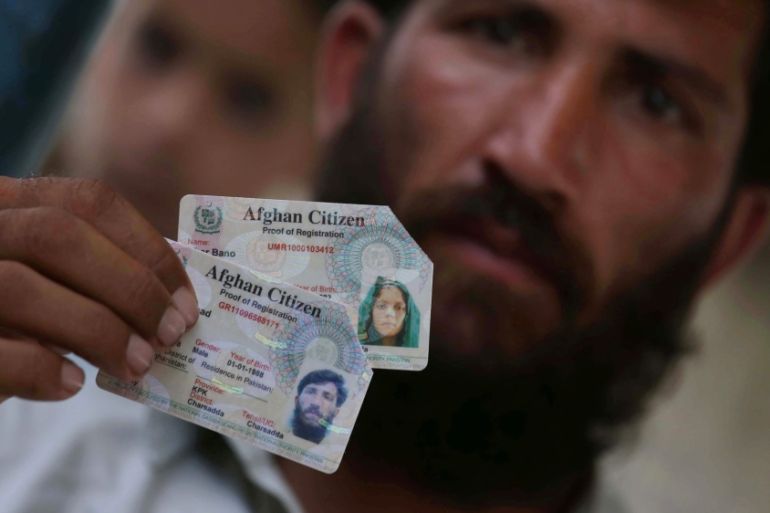Afghans expelled by Pakistan in dire need of aid
Tens of thousands of Afghan refugees expelled from neighbouring Pakistan lack basic necessities.

Aid workers have warned of deadly consequences for tens of thousands of Afghan refugees who have been forced to leave Pakistan for their war-torn country.
Very few of the returnees have received any form of support from local, state or international organisations, Kate O’Rourke, of the Norwegian Refugee Council (NRC), said in a statement on Sunday.
“These people are falling between the cracks. There’s an urgent need for assistance, or the consequences may be fatal,” she said.
|
|
O’Rourke called on the international community to urgently provide funds.
Many of the hundreds of returnee families now have no roof over their heads, children are visibly malnourished, and there is little to no drinking water, families told Al Jazeera.
Mohammed Hakim Yousafi returned to Afghanistan last week after living in Pakistan for almost a decade.
In the refugee camp to which he has been relocated, Yousafi said that he lacks many of the most basic needs.
“I don’t have food, water or shelter at the moment. And I am back to a conflict zone. My life is back to zero after years of making a living in Pakistan and working hard,” he told Al Jazeera.
Saroop Ijaz, a lawyer and Pakistan researcher for Human Rights Watch, told Al Jazeera that the situation is getting “worse” as the “Pakistan government has vowed to force Afghans out of Pakistan” after the 2014 attack on an army-run school in Peshawar that killed 140 people, including more than 100 children.
READ MORE: Afghan returnees from Pakistan endure dire conditions
“The government has started taking necessary steps to push Afghans out of the the country and, because of that, we have come across concrete cases of impunity regarding torture and ill-treatment of Afghan refugees,” Ijaz said.
“Afghan refugees in Pakistan with legitimate refugee documents cannot be sent back, especially if Afghanistan is in the middle of a conflict. It is a clear human right violation if they are being exposed to harm.”
The Pakistani government announced an anti-terrorism plan last year based on a 20-point agenda that included the “Registration and Repatriation of Afghan Refugees” in Pakistan.
Rising abuse cases
Since then, incidents of flagrant police abuses against Afghans have prompted many to return to Afghanistan of their own accord.
Others were refused extensions for their Proof of Registration cards in Pakistan, according to Human Rights Watch.
The card recognises their status as Afghan citizen temporarily residing in Pakistan.
Most of the returning Afghan refugees do so through the Torkham border crossing, arriving in overloaded pick-up trucks and buses.
READ MORE: Afghanistan’s internal refugee crisis
For decades, Pakistan has been home to 1.5 million United Nations-registered Afghan refugees and about one million unregistered Afghans.
Many arrived after fleeing the Soviet-Afghan war in the 1980s.
In June, the UN refugee agency chief urged Pakistanis not to blame Afghan refugees for terrorism in their country.
‘Forgotten’ crisis
Warning that the roughly 2.5 million Afghan refugees in Pakistan risked becoming a “forgotten” crisis, Filippo Grandi, the UN high commissioner for refugees, called on the international community to invest more funds to help them.
“My appeal is that, not only to the authorities but also to the local population: refugees as you know are not terrorists,” Grandi said during a visit to a repatriation centre outside the northwestern Pakistan city of Peshawar in June this year.
Experts say that the ministry responsible for refugees on the Afghan side, the Ministry of Refugees and Repatriation, is poorly equipped and under-financed.
“The failure is from both sides [Pakistan and Afghanistan],” Ijaz, the Pakistani lawyer, told Al Jazeera.
READ MORE – An Afghan refugee in Europe: ‘All I can do is pray’
According to figures published on Sunday, 67,224 Afghans have returned to Afghanistan from Pakistan since mid-July.
Since January, more than 101,000 have been forcibly returned by Pakistan, according to the International Organisation for Migration (IOM), which tracks only those Afghan refugees who have not officially registered with the UN in Pakistan.
Unregistered refugees are not entitled to support in Pakistan or Afghanistan.
“We are providing Afghan returnees with basic healthcare, education, food and shelter,” Nasir Haidarzai, communications officer at IOM Afghanistan, told Al Jazeera.
“However, with that being said, we are in the middle of a conflict zone, and they are indeed exposed to any kind of harm because of it, even we are.”
With reporting by Shereena Qazi, follow her on Twitter: @shereenaqazi.